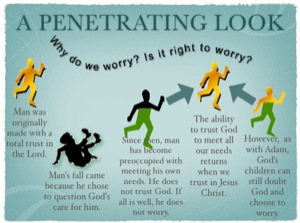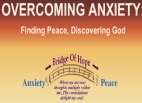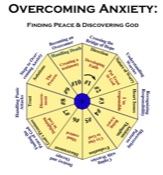
Overcoming Anxiety: Lesson #5
Possessing God's Precious Peace
Discipleship Level 2: Reaching Beyond Mediocrity
Paul J. Bucknell
Problem | Broken | Understand | Description | History | Fighting | Steps | Gate
Video Podcast | D2 Index | RSS
![]()
A Historical Perspective of Anxiety and Worry
We will never rightly understand worry if we do not rightly understand mankind. If we believe in evolution, we probably will assume anxiety is just a malformed function of mankind, or in other words normal. It is all gene-based. This assumption is faulty and results in poor assessment and solutions for anxiety. In most cases, people will take doctor-prescribed drugs for their anxiety. This will make sense if you think anxiety is just an evolved human response. A biblical perspective, however, helps us see things in a wholly different light.
Man was originally perfectly designed and made in the garden. We can safely say that when God made man and assessed him as 'good,' it was indeed good. So this takes us to our first step in a five step diagram (see chart1), though step four is where we should aim.
 #1 Normal faith
#1 Normal faith
Man was originally made with a total trust in the Lord. God was good and man fully trusted God in what God had said and done. Man, however, did not stay there in God's peace and joy for long.
#2 Man lost his faith
Man's fall came because he chose to question God's care for him. Adam and Eve did not trust God rightly provided them the best. Once doubts from the evil one lodged themselves in Eve, they misguided her thoughts so that her perspective was distorted. She doubted God's motive, and lost her trust in God. Her following decision to disobey looked like the right thing to do. She took a course that went against the eternal God. Along with Adam's rebellious decision, they in a sense hurled the world into a deep dark fall. Only after the fall, where man regularly doubts God's goodness, can we sadly say that worry is normal.
#3 Man tries not to worry
Since the fall, man has become preoccupied with meeting his own needs. He does not trust God. If all is well, he does not worry. That is, if he has found a way of taking care of his needs, then he does not worry. He is prone to worry, though, for once he loses his job or some other problem happens in life, he often goes through stages of worry.
Man will be judged for his refusal to trust God. Man stubbornly and pridefully trusts in his own ways to get the best out of life and refuses to repent. He drinks from his cistern, but a crack in it often appears.
#4 Made in the image of God through Christ
Everything changes when a person comes to God through Christ. The ability to trust God to meet all our needs returns when we trust in Jesus Christ.
Allow this truth to penetrate your mind. A believer now is in the same situation where Adam and Eve were in terms of their ability and desire to trust God. We are different in that we have a sinful past but now we can fully trust God. We do not need to worry.
"And have put on the new self who is being renewed to a true knowledge according to the image of the One who created him” (Colossians 3:10).
Worry is now shown not to be normal. For those who trust in God find Him to be a spring of eternal living water. Some, however, do not trust God even when they could and should.
#5 Even the believer can doubt God
The believer, however, can sin and doubt God's care for him. Like Adam and Eve the believer can equally doubt God, trust his own ways and become rebellious. Sometimes the way a believer would trust in other things are not very apparent until we run into disaster, but the Lord fully knows how we trust bank accounts, businesses and jobs instead of Him.
Worry does not become apparent until our 'idols' are broken (and even then we can deceive ourselves with "Oh, I'm not worried.” It is important for us to realize that we can trust God as a believer. This trust in God is so much greater and better than trusting our own schemes to get by.
Summary
Through Christ every believer can live above worry. This is the reason Jesus told us not to worry. "Do not be anxious” (Matthew 6:25, 31, 34). As Christ lives through us, we will grow and live in the peace of God.
Our questions, then, should not be as to how to cope with worry but instead on how to overcome anxiety. If we are not convinced about God's cure for anxiety, then then we will not have any hope of escaping from our anxiety. With a good perspective of the history of anxiety, we can move on and learn more about how to overcome worry. We must start with the way the serpent of old induces us to doubt God's care for us.






